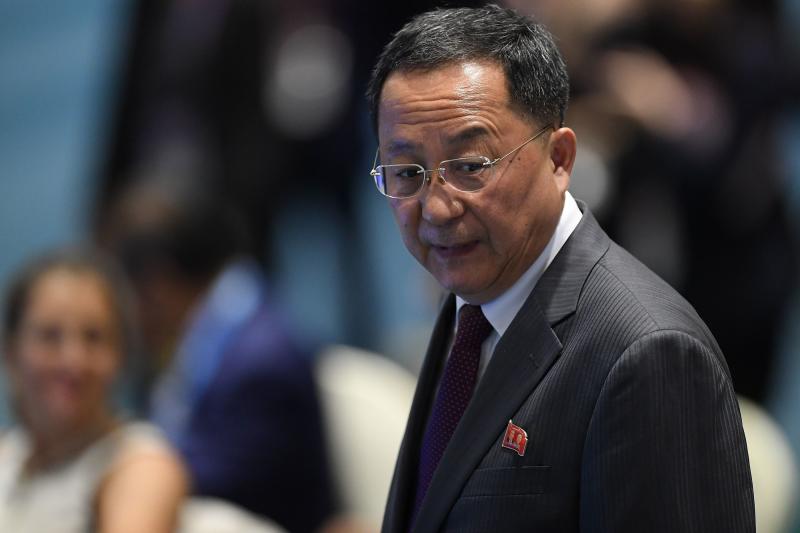North Korean foreign minister slams US for insisting on sanctions and not prioritising confidence-building
Sign up now: Get ST's newsletters delivered to your inbox

Mr Ri Yong Ho charged that the US has not focused on confidence building and has instead been growing increasingly strident on maintaining sanctions and moving away from declaring the end of war.
PHOTO: AFP
SINGAPORE - The North Korean foreign minister has slammed the United States, saying that Washington has not reciprocated Pyongyang's goodwill measures to pave the way towards denuclearisation and peace on the Korean peninsula.
Mr Ri Yong Ho charged that the US has not focused on confidence building and has instead been growing increasingly strident on maintaining sanctions and moving away from declaring the end of war.
The Korean war between 1950-53 was halted only by the signing of an armistice, and has not been replaced by a peace treaty.
"The DPRK-US joint statement should not be permitted to fall prey to the American internal politics, inviting an averse wind at odds with the intentions of the leaders," he was quoted as saying in a statement. The statement of his remarks at the Asean Regional Forum on Saturday (Aug 04) was distributed to the media later in the day.
"We thought of doing something in response if the US would come with constructive ideas. However, as long as the US does not show in practice its strong will to remove our concerns, there will be no case whereby we will move forward first unilaterally," the North Korean minister said.
The joint statement between US President Donald Trump and North Korean leader Kim Jong Un, issued at the end of their historic summit in Singapore in June, strove to usher in a new era of relations between the two sides.
It spoke of building a lasting and stable peace regime on the Korean peninsula, with, among other things, complete denuclearisation.
The only practical way to move forward was to take a "new approach" of prioritising confidence-building, said Mr Ri.
"Confidence is not a sentiment to be cultivated overnight. In order to build full confidence between the DPRK and the US, it is essential for both sides to take simultaneous actions and phased steps to do what is possible one after another," he said.
"Only when the US ensures that we feel comfortable with and come close to it, will we be able to open our minds to the US and show it in action," he added.
This, said Mr Ri, was the core essence of the spirit of the agreement shared by the leaders of both nations.
"The DPRK stands firm in its determination and commitment for implementing the DPRK-US joint statement in a responsible and good-faith manner," he said.
"What is alarming, however, is the insistent moves manifested within the US to go back to the old, far from its leader's intention."
He insisted that North Korea had initiated goodwill measures such as the moratorium on nuclear testing and the dismantling of a nuclear site.
But he said the US was "raising its voice louder" for maintaining sanctions against North Korea, and was "showing the attitude to retreat even from declaring the end of war, a very basic and primary step for providing peace on the Korean peninsula" instead of responding to these moves.
"Worse still, extremely inappropriate moves are shown of putting pressure on other countries not to send high-level delegations to the celebrations marking the 70th founding anniversary of the DPRK in September this year," said Mr Ri.
"Impatience is not helpful at all for building confidence. Especially, advancing unilateral demands will further deepen mistrust instead of reviving trust," he added.
Mr Ri said that it took Asean 50 years to emerge as a regional organisation "with friendly feelings and cooperative atmosphere, enjoying international respect and trust", and that it took 18 years since North Korea joined the Asean Regional forum to witness a landmark change on the Korean peninsula.
Mr Ri said that North Korea was concentrating its efforts on economic construction. Economic revival and uplifting the livelihood of people in North Korea, would be good for peace, security and the economic growth of the region, he noted.
Mr Ri said that for North Korea to achieve this, there needed to be - now more than ever - a peaceful environment in the Korean peninsula and its surroundings.
"The international community should respond to our goodwill measures already taken for denuclearisation with constructive steps that would encourage and promote peace and economic development of the Korean peninsula," he said.


